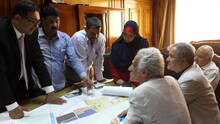Context
The current policy and development programme practiced in Egypt resulted in a high percentage of informal and unplanned areas in the country. Centralization of power and resources at a national government level is a key limiting factor for a sustainable urbanization process. The role of the local government has been restricted to a limited number of tasks in such a way that leads to poor participation of local communities and social responsibility. The relationship between local and national levels is highly centralized, in which policies and development plans are developed at national level, and also where more than 85% of the total government investments are implemented.
Existing urban planning tools are not yet appropriate to make land available at a pace to match rapid urbanization. This stems insufficient land supply, but also increases in land prices and informal areas. After January 25 2011, the scale and pace of informal development has been increasing, due to among others further deterioration of law enforcement. The lack of efficient and accountable urban planning and management systems in Egypt combined with rapid urbanization, have generated socio-political and economic challenges that the country has not been able to keep up with, partly resulting in the recent Arab Spring events. Even though attempts to improve the management of urban development have been ongoing for the past forty years, complicated bureaucracy and weak institutions caused a lack of enforcement and poor land administration.
Programme Goal and Expected Accomplishments
UN-Habitat implemented the Urban Policies, Governance and Legislation Programme in Egypt by drawing on the complementary and synergistic roles of its four strategic partners (the Ministry of Housing and Urban Communities, the Ministry of Local Development, the Ministry of Planning and the Ministry of Finance). The programmes aim is to enhance the capacity of national and local actors to develop urban polices, and reform the legal and institutional framework governing territorial governance and citizen engagement.
A reformed legal and institutional urban structure can ensure a more decentralized and efficient local government. It can also promote the engagement of local communities and development partners in the process of urban development, which avails serviced land and appropriate development densities to meet the requirements of urbanization by increasing areas for public space and streets.
The expected Sub-Programme accomplishments include:
- promoting efficient and decentralized local government;
- enhancing accountability measures and application of relevant instruments at local and regional government;
- establishing a planning process mechanism that provides a platform for mobilizing community efforts and participation in implementing developmental projects in cities;
- building the capacities of local communities, local governments, civil society organizations (CSOs) and other stakeholders especially in policy analysis, planning and financial management;
- increasing dialogue for decision making and strengthening strategic partnerships and collaboration at the national, regional and local levels to enhance the adoption and implementation of relevant urban development polices; promoting youth and women’s engagement in the formulation, implementation and monitoring of urban policies.
Strategic National Development Support Project (October 2008 - December 2016)
The project aims to ensure that national and local stakeholders work jointly in the preparation and implementation of Strategic Development Plans and Budgets at the Governorate and Markaz levels. The expected accomplishments of the projects are: (1) improved institutional framework and capacities for effective partnerships; (2) improved means of implementation by leveraging know-how and consolidating finance; (3) improved development visions and finance for districts and governorates; (4) policy framework to accelerate local development; and inclusive monitoring and evaluation. The key partners are the Ministry of Housing and Urban Communities, the Ministry of Local Development, the Ministry of Planning, and the Ministry of Finance, with associated subnational directorates and municipalities. The project is funded by the Ministry of Housing and Urban Communities and the Ministry of Local Development.
Achieving Sustainable Urban Development Priorities – ASUD Egypt, Part I - City Extension (August 2013 - July 2015)
The project aimed to ensure that the urbanization process can be achieved in a controlled and sustainable manner, and that the expected socio-economic benefits derived from this process translate into an equitable and efficient urban settlement patterns. The key accomplishments expected were (1) improved national awareness on planning cities expansion; (2) improved planning, implementation and monitoring practices in cities extension; (3) systematized knowledge for enhanced management of urban growth in Egypt; and (4) improved regional knowledge on detailed planning for city densification and extension.
The key partners were the Ministry of Housing and Urban Communities, the Ministry of Local Development, the General Organization for Physical Planning, the National Survey Authority and the Qalyobya Governorate. The project was part of a global UN-Habitat programme funded by the Government of Spain.
Participatory Review of Egyptian Planning and Related Urban Development Legislation to Support Sustainable Urban Development Project (January 2014 - March 2015)
The project assisted the Egyptian Government in reforming its legal framework for sustainable urban development in a pro-poor manner by increasing the range of appropriate tools available to increase access to serviced land and lower the proportion of informal development in the country’s cities. The project’s expected accomplishments were: (1) improved understanding of urban planning and management laws and their relationship to and impact on institutional structures; (2) national and local authorities and key stakeholders empowered to effectively guide and manage urban development; and (3) resources mobilised for reform of the urban legal system, including land management, to facilitate urban expansion and increased supply of serviced land in Egypt.
The key partners were the Ministry of Housing and Urban Communities, the New Urban Communities Authority, the General Organization for Physical Planning and the Ministry of Local Development. The project was funded by the German Government (BMZ).

The current policy and development programme practiced in Egypt resulted in a high percentage of informal and unplanned areas in the country. Centralization of power and resources at a national government level is a key limiting factor for a sustainable urbanization process. The role of the local government has been restricted to a limited number of tasks in such a way that leads to poor participation of local communities and social responsibility. The relationship between local and national levels is highly centralized, in which policies and development plans are developed at national level, and also where more than 85% of the total government investments are implemented.
Existing urban planning tools are not yet appropriate to make land available at a pace to match rapid urbanization. This stems insufficient land supply, but also increases in land prices and informal areas. After January 25 2011, the scale and pace of informal development has been increasing, due to among others further deterioration of law enforcement. The lack of efficient and accountable urban planning and management systems in Egypt combined with rapid urbanization, have generated socio-political and economic challenges that the country has not been able to keep up with, partly resulting in the recent Arab Spring events. Even though attempts to improve the management of urban development have been ongoing for the past forty years, complicated bureaucracy and weak institutions caused a lack of enforcement and poor land administration.
[/su_spoiler]
[su_spoiler title="Programme Goal and Expected Accomplishments" style="simple"]
UN-Habitat implemented the Urban Policies, Governance and Legislation Programme in Egypt by drawing on the complementary and synergistic roles of its four strategic partners (the Ministry of Housing and Urban Communities, the Ministry of Local Development, the Ministry of Planning and the Ministry of Finance). The programmes aim is to enhance the capacity of national and local actors to develop urban polices, and reform the legal and institutional framework governing territorial governance and citizen engagement.
A reformed legal and institutional urban structure can ensure a more decentralized and efficient local government. It can also promote the engagement of local communities and development partners in the process of urban development, which avails serviced land and appropriate development densities to meet the requirements of urbanization by increasing areas for public space and streets.
The expected Sub-Programme accomplishments include:
promoting efficient and decentralized local government;
enhancing accountability measures and application of relevant instruments at local and regional government;
establishing a planning process mechanism that provides a platform for mobilizing community efforts and participation in implementing developmental projects in cities;
building the capacities of local communities, local governments, civil society organizations (CSOs) and other stakeholders especially in policy analysis, planning and financial management;
increasing dialogue for decision making and strengthening strategic partnerships and collaboration at the national, regional and local levels to enhance the adoption and implementation of relevant urban development polices; promoting youth and women’s engagement in the formulation, implementation and monitoring of urban policies.
[caption id="attachment_117247" align="aligncenter" width="300"] Stakeholders meeting on land readjustment proposal in Banha, 2014. Photo© UN-Habitat/ Salma Mousallem

[su_spoiler title="Strategic National Development Support Project (October 2008 - December 2016)" style="simple"]
The project aims to ensure that national and local stakeholders work jointly in the preparation and implementation of Strategic Development Plans and Budgets at the Governorate and Markaz levels. The expected accomplishments of the projects are: (1) improved institutional framework and capacities for effective partnerships; (2) improved means of implementation by leveraging know-how and consolidating finance; (3) improved development visions and finance for districts and governorates; (4) policy framework to accelerate local development; and inclusive monitoring and evaluation. The key partners are the Ministry of Housing and Urban Communities, the Ministry of Local Development, the Ministry of Planning, and the Ministry of Finance, with associated subnational directorates and municipalities. The project is funded by the Ministry of Housing and Urban Communities and the Ministry of Local Development.
[/su_spoiler]
[su_spoiler title="Achieving Sustainable Urban Development Priorities – ASUD Egypt, Part I - City Extension (August 2013 - July 2015)" style="simple"]
The project aimed to ensure that the urbanization process can be achieved in a controlled and sustainable manner, and that the expected socio-economic benefits derived from this process translate into an equitable and efficient urban settlement patterns. The key accomplishments expected were (1) improved national awareness on planning cities expansion; (2) improved planning, implementation and monitoring practices in cities extension; (3) systematized knowledge for enhanced management of urban growth in Egypt; and (4) improved regional knowledge on detailed planning for city densification and extension.
The key partners were the Ministry of Housing and Urban Communities, the Ministry of Local Development, the General Organization for Physical Planning, the National Survey Authority and the Qalyobya Governorate. The project was part of a global UN-Habitat programme funded by the Government of Spain.
[/su_spoiler]
[su_spoiler title="Participatory Review of Egyptian Planning and Related Urban Development Legislation to Support Sustainable Urban Development Project (January 2014 - March 2015)" style="simple"]
The project assisted the Egyptian Government in reforming its legal framework for sustainable urban development in a pro-poor manner by increasing the range of appropriate tools available to increase access to serviced land and lower the proportion of informal development in the country’s cities. The project’s expected accomplishments were: (1) improved understanding of urban planning and management laws and their relationship to and impact on institutional structures; (2) national and local authorities and key stakeholders empowered to effectively guide and manage urban development; and (3) resources mobilised for reform of the urban legal system, including land management, to facilitate urban expansion and increased supply of serviced land in Egypt.
The key partners were the Ministry of Housing and Urban Communities, the New Urban Communities Authority, the General Organization for Physical Planning and the Ministry of Local Development. The project was funded by the German Government (BMZ).
[caption id="attachment_117246" align="aligncenter" width="300"] Manshiet Nasser, 2014. Photo© Dyfed Aubrey